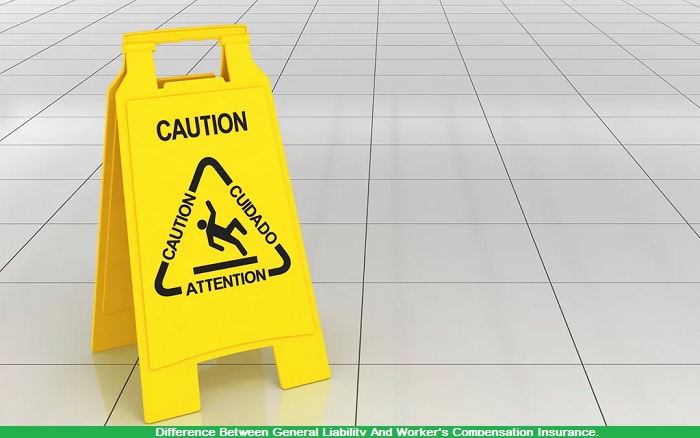Both General Liability and Worker’s Compensation are related to your business. But both ensure smooth operation and are safety nets in two very different scenarios. General Liability pays you when a third party sues you for a variety of reasons. At the same time, Worker’s Compensation pays you when one or more of your employees are injured. So, the main difference between General Liability and Worker’s Compensation is that one protects from damages done to a third party, and the latter covers your employees.
There are a couple of similarities and a few differences between these two insurance types. Let us see each of them step by step.
What Do You Mean By General Liability Insurance?
As already mentioned, General Liability insurance protects your business whenever some third-party damage happens to you. So, the next question arises, which damages does General Liability cover? So, they majorly fall under three heads:
- Suppose a client or anybody for that matter gets injured on your business premises. For example, you run a home bakery, and a client who came to pick up the order tripped over in your premises. Then you are liable to pay him/her the expenses.
- Suppose you damage somebody else’s property. For example, you are a taxi driver, and you bump into someone’s house’s wall. The house owner can sue you for damages.
- Last come the advertising injuries—for example, Libel, trademark infringement, slander, etc. If you copy somebody’s trademark even unintentionally, they may sue you.
If you note, in all these cases, a third-party is getting affected and is filing a lawsuit. Thus, when a lawsuit is filed, your general liability insurance will pay for your court fees, attorney fees, settlements, etc. It will not pay, let’s say, the affected person’s medical bills, but the insurance will kick in if he files a law suit against you.
Also read: General Liability Vs. Business Owner’s Policy
Also, another point to note is, insurance only pays until your limit is reached. Let’s say if you have bought $300,000 insurance, the insurance company will pay you until that limit only.
What Do You Mean By Worker’s Compensation?
Worker’s Compensation protects your employee when they are injured at the workplace or due to work-related reasons. Let us see all the coverages of Worker’s Compensation:
- It covers the medical and recovery expenses of a worker. For example, there is a construction worker, and he or she hurt themselves at work. Then insurance will pay for their treatment and recovery expenses.
- They also provide replacement wages. Since this construction worker cannot work for a few days, the insurance will pay him some replacement wages.
- Sadly, if the injury is fatal, the insurance will also pay dependent support payments and funeral expenses.
- Lastly, this is important; if an employee sues you for a work-related injury, then the insurance will cover liability costs.
Thus, Worker’s Compensation covers all aspects related to workers. And that is why many states have made it mandatory for employers to buy this insurance. You have to buy this even if you have a single employee working with you. But it also depends on the state you live in and the field you are in.
How Are Both These Insurance Types Similar?
However bot these insurance types are very different from each other. They do have some parallel tangents.
- Both pay if there is a bodily injury. However, the difference lies in the fact that who is getting that injury. In general liability insurance, a third-party contracts the damage. While in Worker’s Compensation, your employee contracts it.
- Some industries like construction companies need both the types of insurance. For example, a general contractor will require another construction contractor to have his insurance. This way, the general contractor would not have to pay a penny if something unfortunate occurs over the site.
What Is The Difference Between General Liability and Worker’s Compensation?
Now that we have understood each of these, let us know the difference between them.
- Worker’s comp is compulsory by law, but general liability is not. Worker’s comp is the only insurance required by law after commercial auto insurance (for employers). Also, different states have different rules regarding Worker’s comp. Some states require it after even one part-time employee and some after a certain number of employees.
- Secondly, employers need general liability irrespective of the size of their business. Even a small home bakery with no employees at all needs liability insurance. But it may not need Worker’s comp. Why? Let’s take our previous example of a client tripping over on your premises. Liability insurance will prove to be a great relief in such cases.
When Should You Buy Each Of These Policies?
According to us, even if you have a small business, you must have a general liability policy. It takes a lot of stress off your mind.
Also read: 11 Insurance Policies That Will Keep Your Business Safe!
And Worker’s Compensation is usually mandatory by law.
Since both these policies cover different scenarios, we suggest that you should have both of them. The limit of these policies can depend on your business size and type. But having both of these will keep a lot of stress off your mind, and you can work in peace. And isn’t peace of mind an essential factor to work properly? Apart from peace of mind, insurance saves your hard-earned money in the long run anyway.
Also read: Is Critical illness insurance necessary?
Thus, according to us, you should go ahead and buy both the policies.
This was all in our in this article about the difference between general liability and Worker’s Compensation. We hope you liked the article and that it was informative. However, we have tried to be comprehensive; if you have doubts, drop them in the comments box below. We reply ASAP. Suggestions are also more than welcome!







